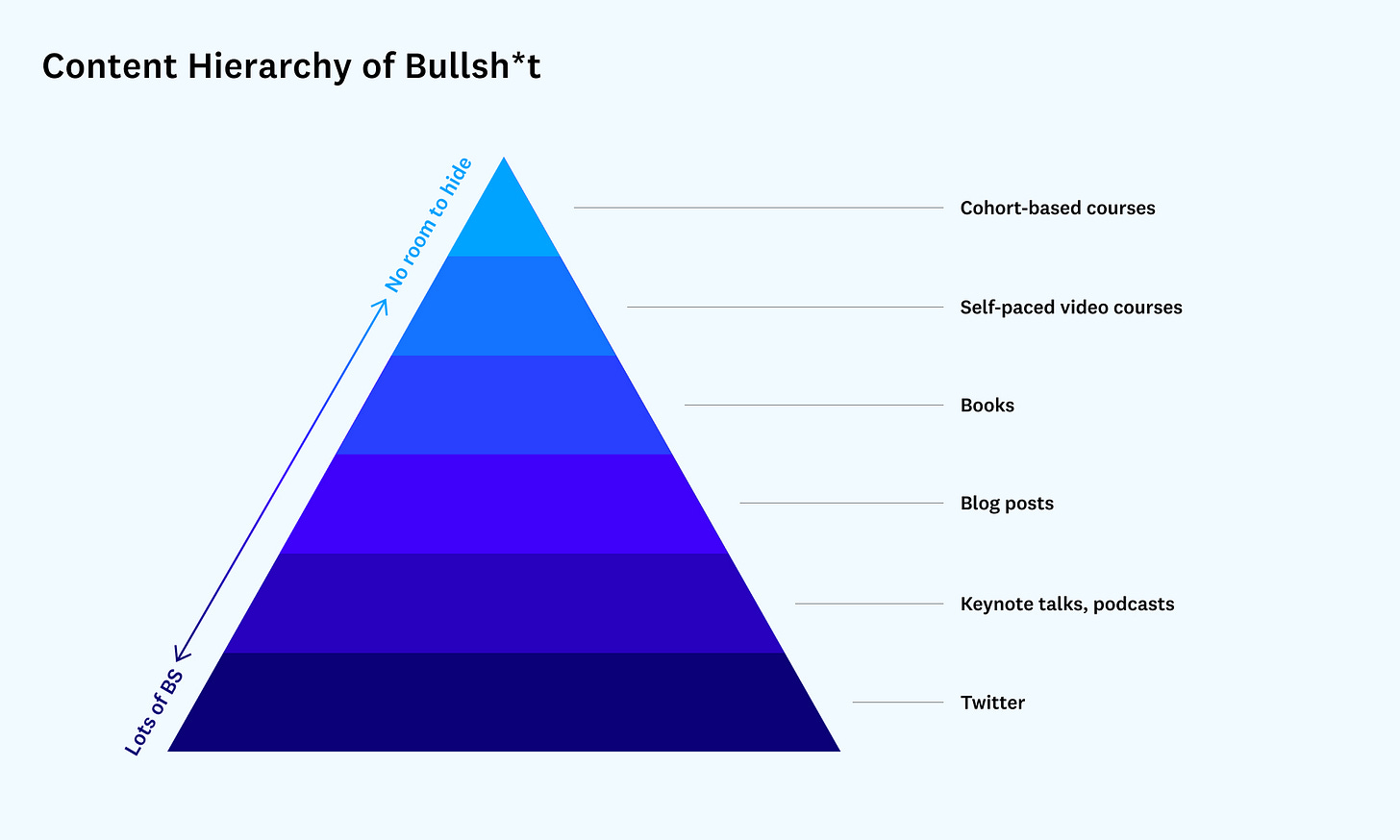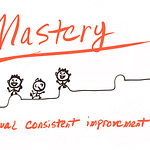Just over a week ago, I took part in the final presentation day and graduation ceremony for the MLOps program at FourthBrain that I had the privilege and pleasure to lead over the last 4 months.
As a guy who’s been teaching university courses for a decade, including teaching up to five days a week during the ‘21-’22 academic year, neither of these goings-on - nor the modality in which they were delivered - felt particularly novel or new.
However, there were a couple of things about our Cohort-Based Course, or CBC, that took the experience to the next level.
The Adventure of Our MLOps CBC
One thing that was new was the subject matter. Machine Learning Operations, or MLOps, is basically still new for everyone. Many have tried to break it down simply, including me. Let me tell ya, it’s a task…
The other aspect of our CBC that felt novel to me, was that the students in the course were incredible, brilliant people, that brought amazing experiences from industry, academia, and many stops in between.
These two key differences - actively evolving subject matter and brilliant students - taken together, made for a uniquely pioneering teaching-and-learning experience that our group of machine learning practitioners - myself and the associate instructor included - got to participate in.
This made for a grand adventure; one in the same stratosphere as the On Deck Course Creator Fellowship program that I was fortunate enough to participate in last year as a learner, and which I’ve written about previously in the Unautomatablog.
This week I wanted to share a few things that I took away from the experience, and that I’ll be taking with me into the (hopefully, fingers crossed) many future teaching and learning experiences with CBCs.
Education Productions; an Aside
Speaking of teaching and learning, I learned something today that was too good not to share while listening to, of all things, a conversation between two late masters of Jungian psychology.
The roots of the word educate break down from the original latin educere as ex, or roughly “out” and ducere, which we’ve seen before means “to bring, to lead.”
We learned in a previous blog that a product is something that is “to lead or brought forth into being or existence.”
Here we see that educate means “to lead or bring out.” You might say that to educate is to produce.
We’ll come back to this overlap in future articles, but for the purposes of these CBC lessons learned, to me, today, to educate means to lead and to draw out who the student could be.
To educate means to lead, and to draw out who the student could be.
⚗️ To be a facilitator of a truly dynamic CBC is to be an education alchemist that creates environments where learners lead and draw out one another, as well as the instructor. That place is where truly magical things can happen.
Five Lessons
TL;DR: here they are.
Fail to prepare; prepare to fail
Pivoting can be riveting
A video is worth a million words
Facilitation is an infinite game
Get out of the way, every day
Fail to prepare; prepare to fail
In short, I learned that the content hierarchy of bullshit is real. There is truly no room to hide when you’re responsible for creating active, hands-on learning experiences. As the accountable instructor and the one who is responsible for the education alchemy, you’re on the hook. If you don’t prepare, you’ll feel it, and so will everyone else. It’s so much easier to decimate a class with slides or a whiteboard presentation than it is to lead with the perfect mix of curiosity, novelty, and a disciplined plan for execution and delivery.
Pivoting can be riveting
At the same time, preparing for class won’t necessarily prepare you for class. A pull, not a push, is what is required to engage learners who are free to go anywhere and do anything for the entire time that they’re with you. This is right in line with starting with customer pains, problems, and needs, rather than with the great technology that you want to put out into the world. Pull, not push. Listen to what the people want.
We’ve all been on zoom calls and in meetings that were a complete waste of our time, but we all also know how it feels like to be in it; cameras on, sitting up straight; engaged.
Sometimes, that perfect disciplined schedule needs to be tossed to the wind for while, because if everyone is loving it, cameras are on, and talking is pretty well distributed amongst the class while you, the facilitator and instructor, are merely nudging things along, there is nothing, I repeat NOTHING, that you could possibly do next, that will make things any better for you than they are right now. Keep close tabs on the momentum, and ride it out. This is when pivoting can be riveting.
Quick tactical note: if things are going well doing rapid breakout sessions, do NOT take a break before the after-breakout discussion, no matter how close to lunch you are.
A video is worth a million words
Truth bomb coming your way. Remember how we mentioned accountability in Lesson 1?
If cameras are off, it’s your fault.
Caveats:
We’re not talking about university courses, where incentives for being in any particular course vary wildly. We’re talking about courses with well-articulated transformational learning journeys, where learners know what they’re signing up for.
We’re not talking day 1, before the people who are going to drop do drop the course. There is always some turnover. We’re talking when people in the room have seriously opted in, with skin in the game including both money and time.
We’re obviously excluding special cases, where people must have their cameras off for short periods of time.
In general, if cameras are off, it is truly because you’re not creating an environment where a story thread, that everyone is contributing to, is making everyone else’s Eyes Light Up, that ELU moment.


Be happy about this; this is perhaps the best and most direct form of feedback that you’ve ever received as an instructor. Embrace it, and you might become one of the great ones. Ignore it at your own peril as an educator in the 21st century. Command and control learning is over. We are officially leading and drawing out from here.
Facilitation is an infinite game
Playing sage on the stage is a finite game; we must play the role guide on the side. When we facilitate and guide, we’re literally engaging in play with the learners in the class.
When we’re really in the facilitation zone we transform into a learner ourselves and find that the journey of education is one with room for everyone. Just as we’re playing referee and doing our best to set people up for the spike, we have to be open to the possibility space that others can play referee, and in some cases, setter.
As Steven Pressfield reminds us
“A PROFESSIONAL DOES NOT SHOW OFF
A professional’s work has style; it is distinctively his own. But he doesn’t let his signature grandstand for him. His style serves the material. He does not impose it as a means of drawing attention to himself.
This doesn’t mean that the professional doesn’t throw down a 360 tomahawk jam from time to time, just to let the boys know he’s still in business.”
So remember, we’re not training students, we’re educating them.
And we ourselves are not simply trained, we’re also educated.
“To be prepared against surprise is to be trained.
To be prepared for surprise is to be educated.”
~ James P. Carse, Finite and Infinite Games
Quick tactical note: you have to establish how many beats of silence you will generally give the class to respond to your questions early on in your facilitator-learner relationship. It’s similar to setting the expectation of exactly how many minutes into the hour you’ll get started with class, but the opposite. The more space that you can leave for silence in the room, just like the closer to “on-time” that you actually start each class, the tighter the group is likely to be.
Get out the way, every day
You’re great and everything, but what learners will remember is not that thing you said. What they will take with them is not that slide.
What they will remember and take with them are the one or two deep relationships that they develop with the people in their cohort. This is the most important thing that you can help them walk away with.
You can, quite frankly, screw almost everything else up, get this right, and walk away with a profoundly pleased (and pleasing) cohort. This is why activities like the famous closeness questions can be invaluable.
Speaking of masters, I asked a few that I knew about how else to shake things up recently, and got some great ideas for getting out of the way.


I buttoned up this particular CBC with a gratitude attack and some Troika Career Coaching consulting. Utterly on point. I wish I would’ve gotten out of the way every day.
Final Thought
Think about the deepest relationships that you’ve ever had in your life that started during an educational experience. I have two friends that I met during one of the first classes of college in 2006 that I’m still great friends with today. I also have an extremely close friend who I met in a CBC two years ago this month. We’ve spoken every week since then. I want to help foster relationships like these.
I want to lead. I want to educate. I want to teach, learn and have fun while I do it.
IMO if you’re currently teaching online, but you’ve never felt like you’re having so much fun that you can’t believe you’re getting paid for it, then you’re not teaching online.
And IMO if you’re learning online, but you’ve never developed a single relationship that’s worth a damn to you, then you’re not learning online.
It’s time that we all upped our game, on both sides.
I’m going to do my best to lead and draw out CBCs of the future, from both sides, and I hope that this article gives you a little bit of fuel and ammunition to do the same.
















Share this post